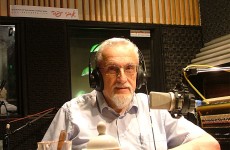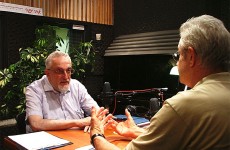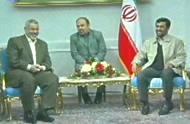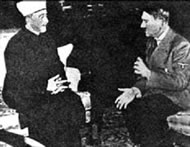Is much of the European media coverage slanted when it comes to covering the Israeli-Palestinian conflict?
Are Israeli government officials ‘verbal vegetarians’ when it comes to confronting the nature of Palestinian terror attacks?
Media Analyst Dr. Manfred Gerstenfeld of the Jerusalem Center for Public Affairs talks to IsraCast about his findings

(Photo: Tomer Yaffe)
‘By and large, European media coverage is biased against Israel’ – that’s the assessment of Dr. Manfred Gerstenfeld, Chairman of the Board of Fellows of the Jerusalem Center for Public Affairs. In an interview with IsraCast, Gerstenfeld also charged that Israel’s government have proved to be ‘verbal vegetarians’ when it comes to confronting the problem.
Listen to Interview with Dr. Gerstenfeld
Dr. Gerstenfeld who speaks English, Hebrew, Dutch, Italian, French and German cites the example of a how a leading Dutch reporter in Israel conducted an ‘exclusive’ interview with Hamas leader Ismail Haniyeh, the Palestinian prime minister of Gaza, but failed to question him about the Hamas charter calling for ‘genocide of the Jews’.
Interview with Dr. Manfred Gerstenfeld
Q: Dr. Gerstenfeld is the Chairman of the Jerusalem Center for Public Affairs. First of all Dr. Gerstenfeld welcome to our program.
A: Good afternoon.

(Photo: Tomer Yaffe)
Q: My first question to you, Sir, and you are familiar with the media coverage, particularly in Europe, what is being said, written about Israel today, and I was wondering for your overall reaction to what you see in the European media when it comes to covering Israel.
A: Of course it is very mixed, but if we had to weigh it, it is undoubtedly the weighted average would be rather biased. One of the prime reasons for that is the discrepancy between the political views of a large part of the media and the population in general. There is no doubt as we see from the first studies of many countries that we find a strong liberal left tendency among a large part of the media, and many of these people show extreme bias against Israel. The typical case is the BBC .
Q: But what about other countries. We are familiar with the BBC and I think that many Israelis would agree that its coverage is often slanted. But what about other European countries. For example you are familiar with the Netherlands.
A: Yes. In the Netherlands I would say that there are some journalists in Israel who are exceptionally biased against Israel, and they happen to work for the two leading newspapers in the country. Some of the television people also show some bias against Israel, other smaller papers are more balanced, and sometimes are even pro-Israel, the Christian papers.
Q: Well these are very serious charges, can you give some examples?

A: I can give many examples, but that would then exhaust this interview. I’ll give you one typical paradigmatic example. At the end of April a Dutch reporter, a television reporter, Conny Mus , was granted a possibility to interview Ismail Haniyeh . He was very proud of himself because he was the first Western journalist to be allowed to interview this man of the movement who promotes genocide, and before him only Arabs had had this great pleasure, so Mus goes to interview Haniyeh, he says in his Dutch program, which anybody who understands Dutch can hear, and still hear and see on the web, and he asks him all the questions except one: “How does your relationship with Israel fit, in view of the fact that in your charter you call for the murder of all Jews?”. That question he doesn’t ask him. And this is the key question. Now, this is not a journalist who came here for two weeks and doesn’t know the Middle East. That’s a guy who has been here for over 15 years, he has been for 5 years the Chairman of the Foreign Press Association, he is a veteran Dutch correspondent in Israel – he is a man who knows exactly what game he is playing.
Q: You speak other languages, for example, Italian, what is the situation in Italy today, would you say?
A: I would say that Italy I follow less than the Netherlands, but it is clear that it is probably the largest paper Republica, and even “La Stampa” , a quality newspaper, still has a strong anti-Israel bias. You find smaller papers like “Journal”, which is the Berlusconi paper, which takes a more balanced or even pro-Israeli view.
Q: France?
A: France is a big problem. It has always been a big problem. The leading quality newspapers are Left, some of them have Trotskyites among their editors, Le Monde and Liberacin are, lets say, fairly negative towards Israel, plus the Agence France Presse , which is still a major agency, which has a strong connection with the Arab world, of course is a major supplier, and France is really a substantial problem.
Q: This seems to be symptomatic of coverage, international coverage of Israel, and I recall that Professor Marvin Kalb , who was here recently, also spoke of how the American media, television in particular, covered the Lebanon war, the Second Lebanon War last summer, where he said that the Hezbollah fighters appeared, were covered as if they were ghosts, they were never seen, because Hezbollah never let pictures be taken or any of the attacks that they carried out, be covered and so on and so forth. You think that this is also symptomatic of what is happening in Europe as well?
A: Yes, it is. We have a problem. It’s the elites in Europe, that is true for left wing politicians, it is true for universities in certain fields, of course not in the Natural Sciences, but in all these paper fields, of paper studies, which are much more difficult than in the Natural Sciences to see the difference between scholarship and propaganda. We see that in the human rights organizations, who sometimes are simply assistants to criminals, and we see that in a broad group of the elite, and this is a very, very dangerous phenomenon and we have in Israel unfortunately our government, hasn’t made the effort to expose that.
Q: What do you think could be done?

A: I think the first thing we should do is stop being verbal vegetarians. We are the only nation in the world which doesn’t fully tell how barbarian its enemies are. It has never been performed, usually people exaggerate the enemy. We under-expose it. We have to first tell with whom we are dealing, what the record of the Palestinians is – the Palestinians are a crime permeated society, ideologically crime-permeated society, the predecessor of Haniyeh, in fact, was the Mufti of Jerusalem who helped put up S.S. units in Bosnia and Kosovo, and wanted to have a concentration camp in Israel. We remain silent about this, and this verbal vegetarianism is at the origin of our weakness in public diplomacy.
Q: Does it also have to do with outright anti-Semitism?
A: It also plays, there is undoubtedly in Europe, an anti-Semitism which has difficulty to manifest itself in the classic ways, so it now reaches the third stage: the first stage was religious anti-Semitism, the second one was political anti-Semitism which led to the Holocaust, the third one is a concentrated or focused on the collective Jews of the State of Israel and I have published a big essay on how anti-Semitism and a anti-Israelism overlap, with a large number of different types of analysis which are also the same.
Q: You mention the Holocaust and what comes to my mind is this idea that perhaps, in light of what happened to the Jews of Europe during the Holocaust, that now maybe there is a tendency among Europeans, to vindicate themselves in some way, by saying: “Look at the Jews: now that they are in power they are also doing brutal things to other people. Well look, the Jews are no better than we were, the Jews are doing the same to the Arabs, the Palestinians.”
A: There is no doubt that that is a reason, it is not the sole reason. Obviously psychologists have looked into this matter and they have come to a conclusion that this is a very effective way to get rid of your own guilt, what is a classical remark is that of a psychologist, Rex, who once said that the Germans will never forgive the Jews for Auschwitz. If the Jews are guilty, then everybody is guilty, if everybody is guilty – nobody is guilty, and with that you find a way to get rid of the memory of your own misbehavior and that of your parents and grandparents, a number of decades ago.
Q: But surely the fact that we had he total Israeli withdrawal from the Gaza Strip by someone like Prime Minister Ariel Sharon, which shocked many parts of the world, was Israel given any credit for that?
A: Short term. We have to make a difference between the structural and the incidental. You can, of course, give, make concessions, which will give you a short term credit and with that time passes. The idea of territory for peace was not workable, so we have moved to another idea – territory for time, and in fact that is what we have been playing for a long time, until we have no more territory to give. So we have to be very careful with the game we are playing.
Q: Thank you Dr. Manfred Gerstenfeld, Chairman of the Board of Fellows at the Jerusalem Center for Public Affairs.
A: You’re welcome.
 Transcript by Dar Translations
Transcript by Dar Translations
972-2-6414722 | dar_doc@smile.net.il




